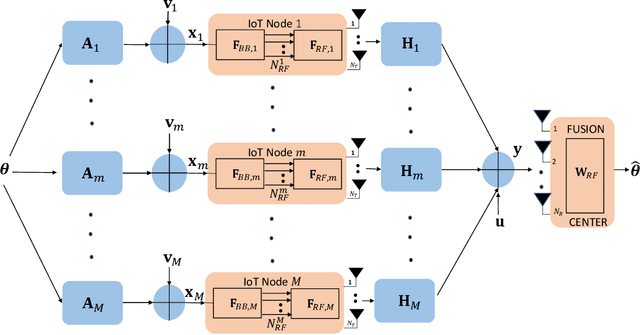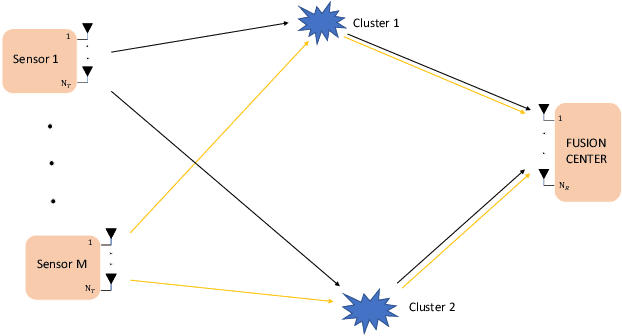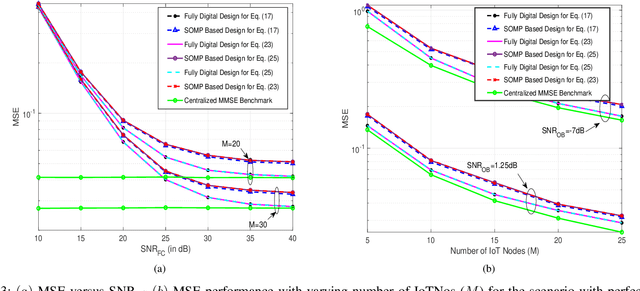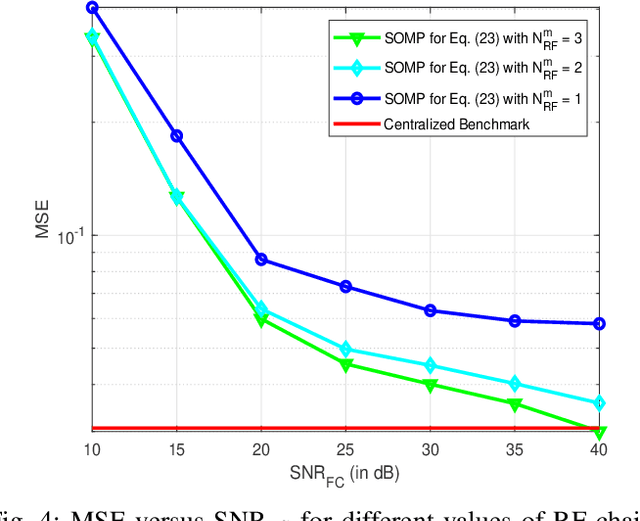Kunwar Pritiraj Rajput
CoFAR Clutter Estimation using Covariance-Free Bayesian Learning
Aug 12, 2024Abstract:A cognitive fully adaptive radar (CoFAR) adapts its behavior on its own within a short period of time in response to changes in the target environment. For the CoFAR to function properly, it is critical to understand its operating environment through estimation of the clutter channel impulse response (CCIR). In general, CCIR is sparse but prior works either ignore it or estimate the CCIR by imposing sparsity as an explicit constraint in their optimization problem. In this paper, contrary to these studies, we develop covariance-free Bayesian learning (CoFBL) techniques for estimating sparse CCIR in a CoFAR system. In particular, we consider a multiple measurement vector scenario and estimate a simultaneously sparse (row sparse) CCIR matrix. Our CoFBL framework reduces the complexity of conventional sparse Bayesian learning through the use of the diagonal element estimation rule and conjugate gradient descent algorithm. We show that the framework is applicable to various forms of CCIR sparsity models: group, joint, and joint-cum-group. We evaluate our method through numerical experiments on a data set generated using RFView, a high-fidelity modeling and simulation tool. We derive Bayesian Cram\'{e}r-Rao bounds for the various considered scenarios to benchmark the performance of our algorithms. Our results demonstrate that the proposed CoFBL-based approaches perform better than the existing popular approaches such as multiple focal underdetermined system solver and simultaneous orthogonal matching pursuit.
Hybrid Precoder and Combiner Designs for Decentralized Parameter Estimation in mmWave MIMO Wireless Sensor Networks
Jun 25, 2023



Abstract:Hybrid precoder and combiner designs are conceived for decentralized parameter estimation in millimeter wave (mmWave) multiple-input multiple-output (MIMO) wireless sensor networks (WSNs). More explicitly, efficient pre- and post-processing of the sensor observations and received signal are proposed for the minimum mean square error (MMSE) estimation of a parameter vector. The proposed techniques exploit the limited scattering nature of the mmWave MIMO channel for formulating the hybrid transceiver design framework as a multiple measurement vectors (MMV)-based sparse signal recovery problem. This is then solved using the iterative appealingly low-complexity simultaneous orthogonal matching pursuit (SOMP). Tailor-made designs are presented for WSNs operating under both total and per-sensor power constraints, while considering ideal noiseless as well as realistic noisy sensors. Furthermore, both the Bayesian Cramer-Rao lower bound and the centralized MMSE bound are derived for benchmarking the proposed decentralized estimation schemes. Our simulation results demonstrate the efficiency of the designs advocated and verify the analytical findings.
Robust Hybrid Transceiver Designs for Linear Decentralized Estimation in mmWave MIMO IoT Networks in the Face of Imperfect CSI
May 18, 2023Abstract:Hybrid transceivers are designed for linear decentralized estimation (LDE) in a mmWave multiple-input multiple-output (MIMO) IoT network (IoTNe). For a noiseless fusion center (FC), it is demonstrated that the MSE performance is determined by the number of RF chains used at each IoT node (IoTNo). Next, the minimum-MSE RF transmit precoders (TPCs) and receive combiner (RC) matrices are designed for this setup using the dominant array response vectors, and subsequently, a closed-form expression is obtained for the baseband (BB) TPC at each IoTNo using Cauchy's interlacing theorem. For a realistic noisy FC, it is shown that the resultant mean squared error (MSE) minimization problem is non-convex. To address this challenge, a block-coordinate descent-based iterative scheme is proposed to obtain the fully digital TPC and RC matrices followed by the simultaneous orthogonal matching pursuit (SOMP) technique for decomposing the fully-digital transceiver into its corresponding RF and BB components. A theoretical proof of the convergence is also presented for the proposed iterative design procedure. Furthermore, robust hybrid transceiver designs are also derived for a practical scenario in the face of channel state information (CSI) uncertainty. The centralized MMSE lower bound has also been derived that benchmarks the performance of the proposed LDE schemes. Finally, our numerical results characterize the performance of the proposed transceivers as well as corroborate our various analytical propositions.
Robust Linear Hybrid Beamforming Designs Relying on Imperfect CSI in mmWave MIMO IoT Networks
Dec 25, 2022



Abstract:Linear hybrid beamformer designs are conceived for the decentralized estimation of a vector parameter in a millimeter wave (mmWave) multiple-input multiple-output (MIMO) Internet of Things network (IoTNe). The proposed designs incorporate both total IoTNe and individual IoTNo power constraints, while also eliminating the need for a baseband receiver combiner at the fusion center (FC). To circumvent the non-convexity of the hybrid beamformer design problem, the proposed approach initially determines the minimum mean square error (MMSE) digital transmit precoder (TPC) weights followed by a simultaneous orthogonal matching pursuit (SOMP)-based framework for obtaining the analog RF and digital baseband TPCs. Robust hybrid beamformers are also derived for the realistic imperfect channel state information (CSI) scenario, utilizing both the stochastic and norm-ball CSI uncertainty frameworks. The centralized MMSE bound derived in this work serves as a lower bound for the estimation performance of the proposed hybrid TPC designs. Finally, our simulation results quantify the benefits of the various designs developed.
Joint Transmit and Reflective Beamformer Design for Secure Estimation in IRS-Aided WSNs
Jan 25, 2022

Abstract:Wireless sensor networks (WSNs) are vulnerable to eavesdropping as the sensor nodes (SNs) communicate over an open radio channel. Intelligent reflecting surface (IRS) technology can be leveraged for physical layer security in WSNs. In this paper, we propose a joint transmit and reflective beamformer (JTRB) design for secure parameter estimation at the fusion center (FC) in the presence of an eavesdropper (ED) in a WSN. We develop a semidefinite relaxation (SDR)-based iterative algorithm, which alternately yields the transmit beamformer at each SN and the corresponding reflection phases at the IRS, to achieve the minimum mean-squared error (MSE) parameter estimate at the FC, subject to transmit power and ED signal-to-noise ratio constraints. Our simulation results demonstrate robust MSE and security performance of the proposed IRS-based JTRB technique.
 Add to Chrome
Add to Chrome Add to Firefox
Add to Firefox Add to Edge
Add to Edge